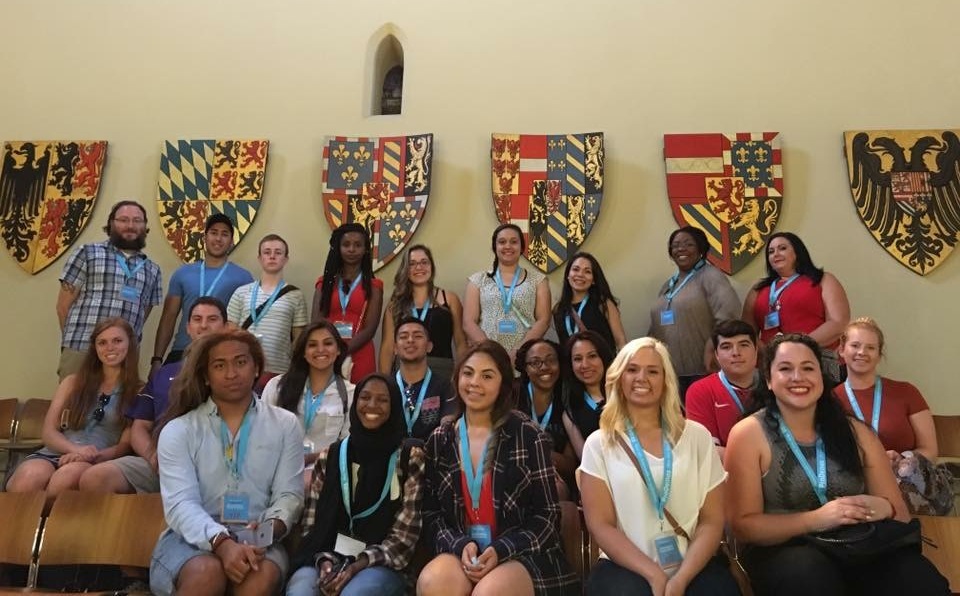Main Content
| Term | Year | Application Deadline | Start Date | End Date | Dates Abroad | Location(s) | Budget |
|---|---|---|---|---|---|---|---|
| Summer Quarter | 2019 | January 31, 2019 | June 24, 2019 | August 23, 2019 | July 16 - August 2, 2019 | The Netherlands (Amsterdam, Rotterdam, and den Haag) |
|
This hybrid program will provide students with an opportunity to explore multiple aspects of criminal justice and related systems, policies, and practices within contexts of the U.S. and the Netherlands. Students will spend three weeks on campus for face-to-face instruction prior to departure, with another three weeks of instruction spent on campus upon their return. While abroad, students will engage local service providers and members of the criminal justice community to discuss Dutch approaches to issues of mental health and substance use, (de)criminalization of sex work, LGBTQ experiences with criminal justice systems, and dynamics of international law and justice.
Students will study these dynamics in U.S. contexts and in the Netherlands more broadly, with field trips to den Haag to visit sites such as the International Criminal Court, Dutch Parliament and the Peace Palace. Additionally, students will meet with local university students and faculty in Rotterdam. While the course work and credits for this program are for criminal justice, this program is open to all students on the three UW campuses who are interested in a deeper exploration of these concepts.
This study abroad program is taught by professors Diana Falco and Jeff Cohen from UW Tacoma.
Academic Content
This program does not have any prerequities or language requirements. Students receive a total of fifteen credits for the program as follows:
TCRIM 450: Comparative Criminal Justice Systems (5 credits)
This course examines the design, function, and legal basis for non-U.S. criminal justice systems. Engages cross-cultural analyses of the connection between governmental, political, demographic, and economic factors in explaining historical and contemporary trends. Compares and contrasts non-U.S. and U.S. criminal justice systems. Includes a study abroad component.
Learing Goals Include:
- Critically analyze principles of criminal justice and criminology and apply them to the country(ies) under study.
- Demonstrate an understanding of the social, political, cultural, and ethical context of criminal justice reform in national and international contexts.
- Evaluate the relative merits of innovative and/or alternative models of justice as practiced in the country(ies) under study.
- Compare and contrast U.S. systems of criminal justice with those operating in the country(ies) under study.
- Demonstrate sufficient critical self-awareness to understand the influence of personal biases and values when interacting within countries outside of the U.S.
- Engage in informed discourse related to criminal justice systems within the U.S. and abroad.
TCRIM 361 or TSOCWF 361: Mental Health, Substance Abuse, and the Criminal Justice System (5 credits)
This course examples the intersection of mental health, substance use, and the criminal justice system. Focuses on the interaction of mental health and criminal justice practice. Explores the prevalence of mental health and substance use and best practices for treatment.
Learning Goals Include:
- Explain why jails and prisons are the new asylums and how the mentally ill came to be over- represented in them.
- Understand the symptoms and manifestations of symptoms for the common major mental illnesses in the criminal justice system.
- Describe the complex and controversial problem of treating mental health in the criminal justice system.
- Outline theories of causation of substance use and the diagnostic implications of these theories.
- Describe the differences and challenges of treating chemical dependency in the criminal justice system.
- Discuss concepts of effectiveness of chemical dependency treatment and mental health treatment in the criminal justice system.
- Apply theory, empirical findings, and their implications assessing the criminal justice system in creating future directions for consideration and discussion.
TCRIM 364: Criminal Justice & the LGBTQ Experience (5 credits)
This course examines experiences of LGBTQ people through the stages of criminal justice systems. Explores the history of the LGBTQ movement through policy and law. Examines criminal justice organizations and their treatment of LGBTQ people. Examines the consequences of discrimination toward LGBTQ people throughout the criminal justice process.
Learning Goals Include:
- Understand the history of the criminalization of LGBTQ people in the United States.
- Explore the impact of policy and law on the lives of LGBTQ people.
- Assess the relationships between federal and state legislation and their local impacts.
- Exmine the experiences of LGBTQ people throughout the criminal justice process.
- Analyze criminological theories as they pertain to LGBTQ people and communities.
- Develop an understanding of LGBTQ people as victims and offenders.

Program Schedule
The program runs from June 24 - August 23, 2019 with July 16 - August 2 spend abroad.
Housing and Food
Students will be staying in youth hostels and commercial hotels as they move to three different cities within The Netherlands (Amsterdam, Rotterdam, and den Haag). Hotel rooms will be double occupancy, and in hostels 4-6 students will be sharing a room.
Field Trips
This program includes two field trips to den Haag and Rotterdam. In den Haag, students will visit sites such as the International Criminal Court, Peace Palace, and Dutch Parliament. In Rotterdam, students will meet with local university students and faculty. All costs associated with this these field trips (transportation, accommodation and meals) are included in the program fee.
Student Eligibility
While the course work and credits for this program are for criminal justice, this program is open to all students on the three UW campuses.
Application Deadline
Applications are due on January 31, 2019. Applicants will be notified of acceptance decisions by February 12, 2019. Once accepted to the program, applicants will need to confirm their participation in the program by February 26, 2019. Click the "Apply Now" button below to begin.
Travel Documents and Insurance
All program participants must have a valid passport in order to travel to Europe.
Visas
No visa or other paperwork is required for U.S. citizens. For international students, the Office of Global Affairs is not responsible for obtaining visas for your travel. You can research visa requirements by calling the consular offices of countries to where you will be travelling or visiting the following website: http://travel.state.gov/content/passports/english/country.html.
The cost and requirements for obtaining visas vary. It is your responsibility to determine visa requirements for all countries you plan to visit while abroad including countries that you plan to visit before or after your study abroad program. This is an especially important consideration if you are planning to do more than one study abroad program.
Insurance
The University of Washington requires students engaged in educational activities abroad – including study, research, internships or community engagement – to purchase UW Student Abroad Insurance. If you are a current UW student, you are required to purchase coverage UW Student Abroad Insurance. Details are on the UW Study Abroad Insurance page.
Program Cost

The progam fee is $4,550.
Included in the cost of the program:
- $450 Administrative Fee
- Instruction
- Housing and food
- Program activities and program travel
Not included:
- Airfare
- UW Student Abroad Insurance
- Transportation to and from the airport
- Personal expenses (phone calls, eating out, etc.)
- Textbooks
Payment Due Date: July 12, 2019
Program fees will be posted to your MyUW student account and can be paid the same way that you pay tuition and other fees. Check your MyUW Account periodically for due dates.
Withdrawals
The $450 UW Study Abroad Fees are non-refundable once a contract has been submitted. Students withdrawing from a program are responsible for paying a percentage of the program fee depending on the date of withdrawal. More details about the withdrawal policy are included in your payment contract. No part of the program fee is refundable once the program has begun. The date of withdrawal is considered the business day a withdrawal form is received by the Office of Global Affairs. Notice of withdrawal from the program must be made in writing by completing the following steps:
- Provide notice in writing to the program director that you will no longer be participating in the program.
- Submit a signed withdrawal form to the Office of Global Affairs.
Financial Aid and Scholarships
- A large percentage of UW students utilize financial aid to study abroad. Most types of financial aid can be applied to study abroad fees.
- For UW Tacoma students, you can submit a revision request to increase the amount of aid for the quarter you are studying abroad. These additional funds are usually awarded in the form of loans. To apply, fill out a revision request form, attach the budget sheet (available via the link at the top of this brochure) and submit these documents to the UW Tacoma Office of Financial Aid.
- For UW Seattle or Bothell Students, you can apply by filling out a revision request form, attach the budget sheet (available via the link at the top of this brochure) and submit these documents to the Office of Financial Aid.
- Consult the Financial Aid section of our website for more information on applying for financial aid, special considerations for summer and early fall programs, and budgeting and fundraising tips
- Please also review this list of scholarships: these are opportunities that can help fund your study abroad experience. Please note that many of them have deadlines before your study abroad application is due. For help with the application process, please contact uwtintl@uw.edu.
Budgeting Tools
We understand that figuring out your finances for study abroad can be complicated, and we are here to help. Here are some ways to find additional support:
- Click on the Budget Sheets link at the top of this brochure to view the estimated budget of all expenses for this program.
- UW Tacoma students can attend a How to Fund Your Study Abroad event - more information is on the Events page of our website.

Changes in Cost or Scope of Program
In the event of significant devaluations of the dollar, some adjustments to program activities may be necessary. If there are any political events that might compromise the safety of the participants, a rescheduling or cancellation of the program may be necessary. If such changes occur, students will be notified of the changes and options will be presented.
Orientation
To be eligible to study abroad, all program participants must attend an online pre-departure orientation facilitated by the Office of Global Affairs as well as your program-specific orientations, offered by your program directors. Orientation must be completed prior to the enrollment deadline for the quarter that you are studying abroad.
Program Cancellation
If viable enrollment is not reached by April 1, 2019 the program will be cancelled. Participants will be notified and the administrative and program fees will be refunded.
Disability Accommodations
The University of Washington is committed to providing access and reasonable accommodation in its services, programs, activities, and education for individuals with disabilities. To request disability accommodation for this program, contact Disability Resources for Students at least 8 weeks in advance of your departure date. Contact info at tacoma.uw.edu/drsuwt.
